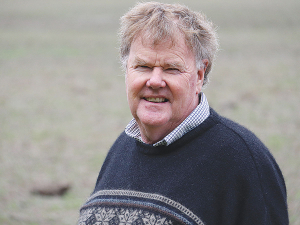Upper North Island Storms: Limited impact on dairy farms
For the most part, dairy farmers in the Waikato, Bay of Plenty, Tairawhiti and the Manawatu appear to have not been too badly affected by recent storms across the upper North Island.
 Farm consultant Lochie MacGillivray says farm system changes will be needed to meet new winter grazing regulations.
Farm consultant Lochie MacGillivray says farm system changes will be needed to meet new winter grazing regulations.
A Hawke's Bay-based farm consultant reckons there will be a need for farm system changes next season in order for farmers to meet new winter grazing regulations.
Agfirst's Lochie MacGillivray says while farmers in the region are responding to the new requirements, many are still learning how to manage the situation and all the requirements are not yet being met. MacGillivray believes most farmers are working out how they will cope next year.
"Some of the paddocks where they have extensively winter grazed, they won't be able to in the future because of slope. How they manage that going forward is something that is in the back of their minds," he told Rural News.
"They are thinking about the paddocks they have got to turn over or cultivate now and there are question marks around that which haven't been resolved."
MacGillivray says some farmers will sell their stock earlier to avoid having to graze them in winter, while others may cultivate and crop the easy country for a while. Others, he adds, may try and take stock through and graze off pasture - although that might come under the new freshwater plans as well.
"It's all a bit noisy and confused up here. The Government might have a clear idea in their minds about what they want, but how that is implemented on the ground is not clear," he adds.
"For example, I believe that regional councils haven't worked out how they are going to police the regulations because they don't have the staff resource to do that."
From Drought To Deluge
Lochie MacGillivray says it's been a fairly wet July in Hawke's Bay with some areas having received twice the rainfall of previous years.
He says water tables are high - if not at record levels - and this has potentially slowed down pasture growth because soils are very wet.
"This means that pasture utilisation starts to slip off a bit as paddocks get muddy," he explains. "Having said that, we went into the winter with really good pastures covers and that was maintained through June - so there is no concern about a lack of feed for stock, although some farmers are feeding out or speeding up their rotations to avoid pugging."
MacGillivray says generally stock health is quite good but scanning is a bit mixed with some good and some moderate results. He says lambing will be good, but doubts whether it will be a record year.
"The worry for farmers at present is getting stock killed, because there is still waiting time with bobby calves talking precedence for killing space," he told Rural News.
"Some farmers were taking lambs to heavier weights and that's kind of limited their opportunities in terms of marketing because these lambs are almost potentially too heavy."
Fonterra’s impending exit from the Australian dairy industry is a major event but the story doesn’t change too much for farmers.
Expect greater collaboration between Massey University’s school of Agriculture and Environment and Ireland’s leading agriculture university, the University College of Dublin (UCD), in the future.
A partnership between Torere Macadamias Ltd and the Riddet Institute aims to unlock value from macadamia nuts while growing the next generation of Māori agribusiness researchers.
A new partnership between Dairy Women’s Network (DWN) and NZAgbiz aims to make evidence-based calf rearing practices accessible to all farm teams.
Despite some trying circumstances recently, the cherry season looks set to emerge on top of things.
Changed logos on shirts otherwise it will be business as usual when Fonterra’s consumer and related businesses are expected to change hands next month.

OPINION: Here w go: the election date is set for November 7 and the politicians are out of the gate…
OPINION: ECan data was released a few days ago showing Canterbury farmers have made “giant strides on environmental performance”.